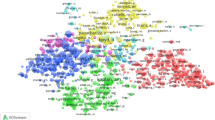Abstract
Robert Putnam in his book Bowling Alone and subsequent works has analysed the phenomenon that American society increasingly avoids various community driven activities, such as civic associations, activities with friends and family (Putnam, Bowling Alone. Simon and Schuster, New York; 2006). In this paper we introduce the idea that a counterpart to this social trend is a global addiction to fame and celebrity. We believe that the global internet is one of the major drivers of this search for fame for the sake of being famous. However, most people aspiring to be famous celebrities will not succeed in this quest, and become disappointed. The purpose of this paper is to analyse the ethical implications of such social contagion, bandwagon effects in today’s global business environment towards fame and celebrity. The contribution of this paper is to provide a future direction for research on business ethics in terms of this growing global phenomenon of fame and celebrity addiction.
Similar content being viewed by others
References
Abrahamson E.: 2006, Management Fashion, Academy of Management Review, 21(2), 254–285
Carrigan M., I. Szmigin, 2000: Advertising and Older Consumers: Image and Ageism, Business Ethics: A European Review, 9(1), 42–50
Carter, B.: 2006, ‹Why Hold the Superlatives? American Idol is Ascendant’, New York Times, January 30, p. 3
Chossat V., O. Gergaud: 2003, Expert Opinion and Gastronomy: The Recipe for Success, Journal of Cultural Economics, 27, 127–141
Cohan, J., 2001: Towards a New Paradigm in the Ethics of Women’s Advertising, Journal of Business Ethics, 33(2), 323–337
Dawking, R.: 1976, `The Selfish Gene' (Oxford University Press)
Foster J., K. Campbell, J. Twenge 2003. Individual Differences in Narcissism: Inflated Self-Views Across the Lifespan and Around the World. Journal of Research in Personality, 37(1), 469–486
Frank, R. H. and P. J. Cook: 1995, The Winner Take All Society: How More and More Americans Compete for Every Fewer and Bigger Prizes (Free Press, New York)
Gaski J., 2001: Normative Marketing Ethics Redux, Incorporating a Reply to Smith. Journal of Business Ethics, 32(1), 19–34
Halpern J. 2007. Fame Junkies. New York: Houghton Mifflin
Henrich J., F. J. Gil-White 2001. The Evolution of Prestige: Freely Conferred Status as a Mechanism for Enhancing the Benefits of Cultural Transmission. Evolution and Human Behavior 22(3), 165–196
Hirsch P., 1972: Processing Fads and Fashions: An Organisation Set Analysis of Cultural Industry Systems, American Journal of Sociology, 77(1), 45–70
Hodgson G., 2003: The Hidden Persuaders: Institutions and Individuals in Economic Theory, Cambridge Journal of Economics, 27(1), 159–175
Maury M., D. Kleiner, 2002: E-Commerce, Ethical Commerce?, Journal of Business Ethics, 36(3), 21–32
Negus K.: 2002, The Work of Cultural Intermediaries and the Enduring Distance Between Production and Consumption, Cultural Studies 16(4), 501–515
Pires G., J. Stanton, 2002: Ethnic Marketing Ethics, Journal of Business Ethics, 36(3), 111–118
Putnam R. 2006. Bowling Alone. New York: Simon and Schuster
Rosen S., A. Sanderson: 2001, Labour Markets in Professional Sports, The Economic Journal 111, F47–F68
Schelling T. C., 1978: Micromotives and Macrobehavior. (Norton, New York)
Seaman B., 2003: Cultural and Sport Economics: Conceptual Twins?, Journal of Cultural Economics 27(1), 81–126
Smith C., 2001: Ethical Guidelines for Marketing Practice, Journal of Business Ethics, 32(2), 3–18
Spurgin E., 2003: What’s Wrong with Computer-Generated Images of Perfection in Advertising, Journal of Business Ethics, 45(3), 257–268
Urrutiaguer D.: 2002, Quality Judgements and Demand for French Public Theatre, Journal of Cultural Studies 22(1), 185–202
Author information
Authors and Affiliations
Corresponding author
Rights and permissions
About this article
Cite this article
Choi, C.J., Berger, R. Ethics of Global Internet, Community and Fame Addiction. J Bus Ethics 85, 193–200 (2009). https://doi.org/10.1007/s10551-008-9764-6
Received:
Accepted:
Published:
Issue Date:
DOI: https://doi.org/10.1007/s10551-008-9764-6




